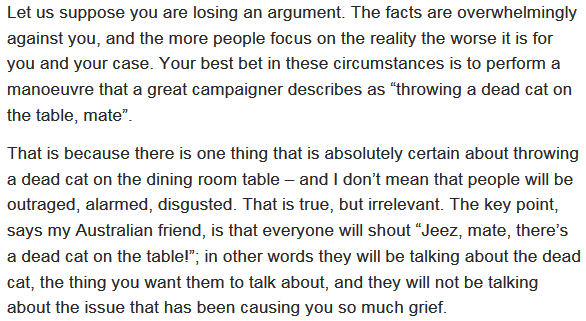A Short Monograph in favour of the Taxation of Dead Cats

Copyright: Boris Johnson, 2013.
***
Here are some dead cats frequently cast onto your dining table by misbehaving businesses.
We comply with the law in all jurisdictions in which we operate. Unpacked, this merely means: “because it’s lawful, we do it.” Tax avoidance – even in its most egregious forms – is lawful. If it isn’t lawful, it doesn’t avoid tax. But that doesn't mean it's not morally questionable. If I avoid tax, I increase the burden on those who pay theirs. If I am a business and I avoid tax I can undermine those businesses who don't avoid it. And the allegation that behaviour is not moral is not answered by the response: "it's lawful". If you don't believe me, try it on the spouse you've been unfaithful to. Look at all the other taxes we pay. Yep. You pay them because the law obliges you to. The lipstick applied to this pig is the technical terminology of TTC or Total Tax Contribution. It is absolutely true that businesses are wealth generators and make a critical contribution to our society. Out of economic self interest (it's called the profit motive, Ladies and Gentleman), they employ staff who also pay tax, generate economic activity for other business who also pay tax, and so on. They also pay other taxes. But none of this stuff - important though it is - gives them a free moral pass when it comes to the moral imperative to pay their share of this tax too. If MPs don’t like it they should change the law. This ignores the limited scope that our domestic Parliament, bound by a web of international tax treaties and EU law, has unilaterally to improve the law. Think Global Climate Change Summits with whistles. And whatever you've read, no Government is a fan of tax avoidance. It reduces its ability to achieve its real political goals: for this Government, for example, perhaps reducing the headline rate of income tax. On a whim (we're strange creatures us tax lawyers) I traced back as far as a 1959 Manifesto political parties promising to "change the tax system to deal with the tax-dodgers". Every Government ever has tried: the fact that none of them has succeeded might tell you something.
***
But why do I say we should tax these Dead Cats? And how should we tax them?
They add to the moral failing of tax avoidance a further moral failing of attempting to dissemble the first moral failing away. So when you see it, call it out. Tax it reputationally. #DeadCat
***
I don't want to kid you.
Not all behaviour that avoids tax has a moral dimension. No one sensible could say that moral obloquy attaches to someone who avoids capital gains tax by buying shares through an ISA. Nor is there any principal - legal or moral - that obliges us to transact in ways that maximise the tax we have to pay. And there are many, many cases where it's difficult to work out whether what we're doing is consistent with what Parliament could have intended.
But none of this has as its consequence that - as some assert - there is no moral component to taxation. There is.
***
There is more work to be done in this field.
Recent Government initiatives have looked beyond the hard yards of purely legal solutions to these issues. They have sought to focus on the wide open spaces - identified by a number of thinkers in the field, including me - of risk management: both reputational risks for businesses and financial risks for Government. How can Government raise the reputational risks for businesses that engage in 'bad' tax behaviour? How can it keep at Gas Mark 9 the temperature under tax avoiders? How can it increase the pre-tax cost attached to behaviours that focus on improving post-tax returns? And how can it reduce the risks to public finances?
Thankfully, there is more to come.
[twitter-follow screen_name='jolyonmaugham']

